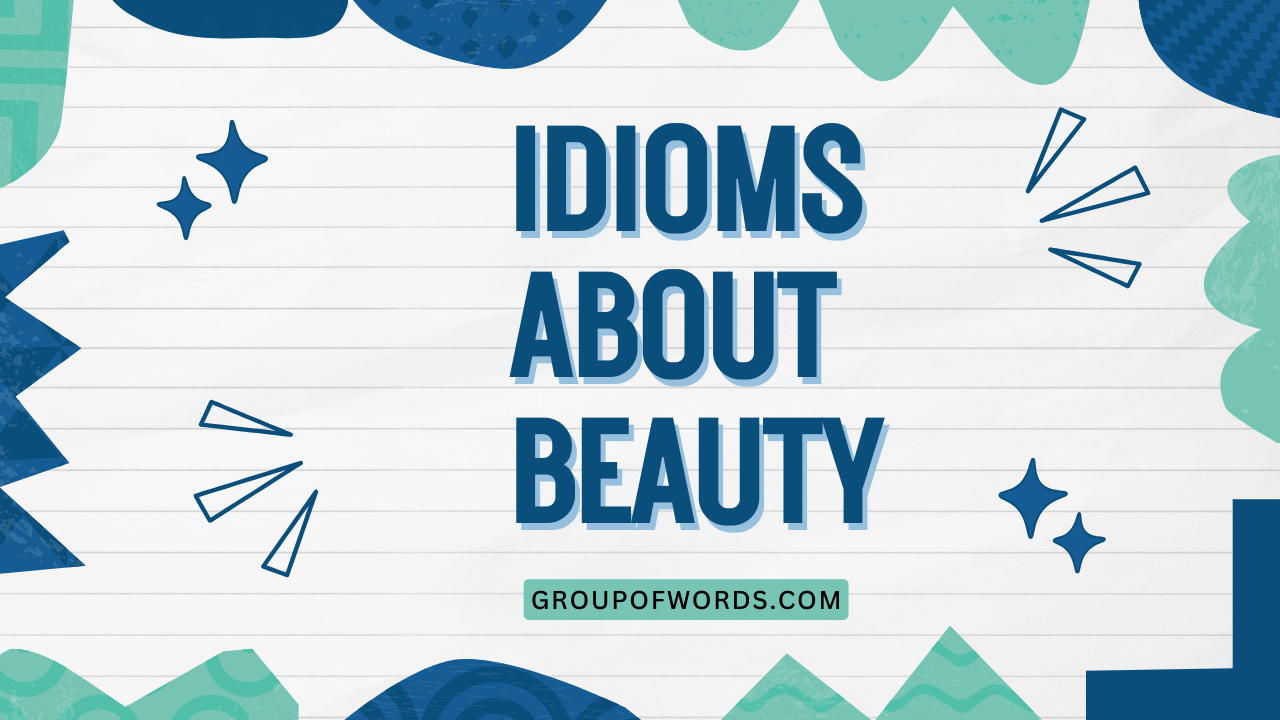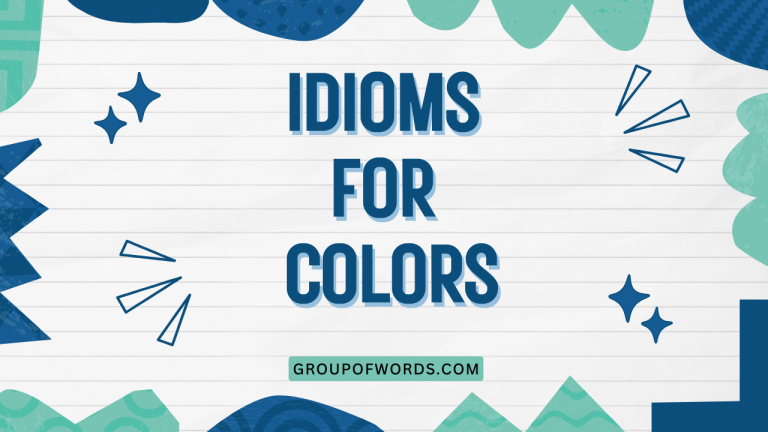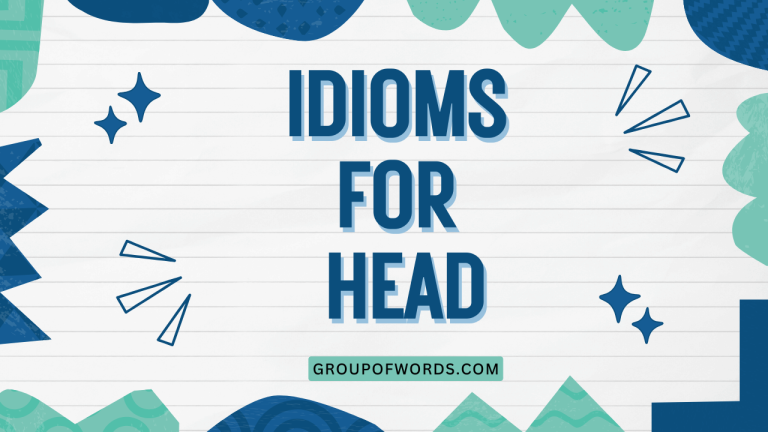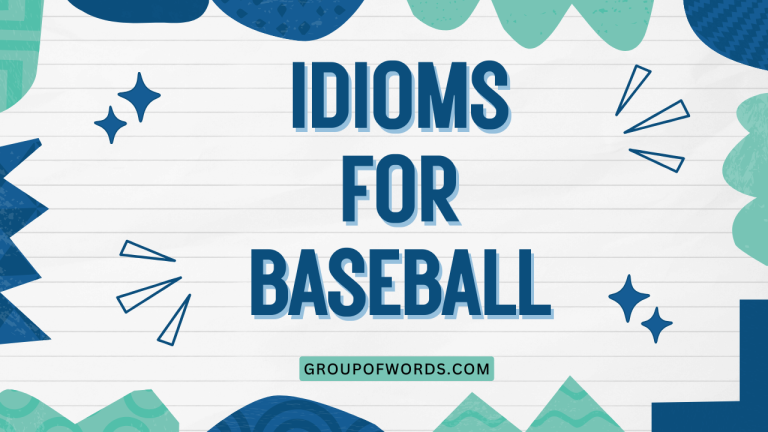Idioms About Beauty: Enhancing Your English Vocabulary
Idioms add color and depth to the English language, making conversations more engaging and expressive. When it comes to describing beauty, there’s a rich collection of idioms that go beyond simple adjectives.
Understanding these idioms not only enhances your vocabulary but also provides insight into cultural perceptions of beauty. This article is designed for English language learners of all levels who want to master beauty-related idioms, improve their fluency, and gain a deeper appreciation of the nuances of English expression.
By exploring definitions, examples, and practice exercises, you’ll be well-equipped to use these idioms confidently and accurately.
This article will explore various beauty idioms, their meanings, and how to use them correctly. We will delve into common mistakes, provide practice exercises, and answer frequently asked questions to ensure a comprehensive understanding.
Whether you’re a beginner or an advanced learner, this guide will help you incorporate these colorful expressions into your everyday conversations.
Table of Contents
- Definition of Idioms About Beauty
- Structural Breakdown of Beauty Idioms
- Types and Categories of Beauty Idioms
- Examples of Beauty Idioms
- Usage Rules for Beauty Idioms
- Common Mistakes When Using Beauty Idioms
- Practice Exercises
- Advanced Topics in Beauty Idioms
- Frequently Asked Questions
- Conclusion
Definition of Idioms About Beauty
An idiom is a phrase or expression whose meaning cannot be understood from the literal meanings of its individual words. Instead, idioms have a figurative meaning that is culturally understood.
Idioms about beauty are expressions that describe aspects of physical appearance, inner qualities, or the perception of beauty in a non-literal way. These idioms often reflect societal values and cultural standards related to beauty and attractiveness.
Beauty idioms can be classified based on what aspect of beauty they describe. Some may refer to physical features, while others may describe inner qualities like kindness or intelligence. The function of these idioms is to add color and nuance to descriptions of beauty, making them more vivid and engaging. The context in which they are used is crucial, as the same idiom can have different connotations depending on the situation and the speaker’s intent.
For example, saying someone is “easy on the eyes” is an idiom that means they are physically attractive. The individual words “easy,” “on,” and “eyes” don’t convey this meaning on their own.
It’s the combination of these words in a specific order that creates the idiomatic expression. Understanding the cultural context is also essential, as what is considered beautiful can vary greatly across different cultures and time periods.
Structural Breakdown of Beauty Idioms
The structure of beauty idioms varies, but many follow common patterns. Some idioms are simple phrases consisting of an adjective and a noun, while others are more complex clauses or sentences.
Understanding these structures can help you recognize and use beauty idioms more effectively.
Many beauty idioms involve a figurative comparison, often using similes or metaphors. For example, “pretty as a picture” uses a simile to compare someone’s beauty to that of a pleasing image.
Other idioms may use personification, assigning human qualities to abstract concepts like beauty or attractiveness. For instance, “beauty is in the eye of the beholder” suggests that beauty is subjective and dependent on individual perception.
The grammatical structure of these idioms is usually fixed, meaning that the words cannot be changed or rearranged without altering the meaning or making the expression sound unnatural. For example, you can’t say “pretty like a picture” and retain the same idiomatic meaning.
The specific words and their order are integral to the idiom’s identity. Recognizing this fixed structure is key to using these idioms correctly in speech and writing.
Types and Categories of Beauty Idioms
Beauty idioms can be categorized based on the aspect of beauty they emphasize. Here are some common categories:
Physical Appearance
These idioms describe outward beauty, focusing on physical features and attractiveness. Examples include “easy on the eyes,” “a knockout,” and “drop-dead gorgeous.” These phrases are often used to compliment someone’s looks or to describe someone who is considered very attractive.
Inner Beauty and Character
These idioms emphasize qualities like kindness, intelligence, and compassion, suggesting that true beauty lies within. Examples include “a heart of gold,” “beautiful soul,” and “inner glow.” These idioms highlight the importance of character and personality in defining someone’s overall beauty.
Comparative Beauty
These idioms compare someone’s beauty to something else, often using similes or metaphors. Examples include “pretty as a picture,” “radiant as the sun,” and “fair as a rose.” These comparisons evoke vivid images and enhance the description of someone’s beauty.
Aging and Beauty
These idioms address the concept of beauty over time, often discussing how beauty changes or endures with age. Examples include “aging gracefully,” “a timeless beauty,” and “still got it.” These expressions often celebrate the beauty and wisdom that come with age.
Effort and Beauty
These idioms relate to the effort or actions taken to enhance beauty, often involving grooming or self-care. Examples include “all dolled up,” “dressed to kill,” and “put your face on.” These phrases often describe the process of preparing and presenting oneself in a polished and attractive manner.
Examples of Beauty Idioms
Understanding idioms requires seeing them in context. The following tables provide examples of beauty idioms categorized by the aspects of beauty they describe.
Physical Appearance
The table below provides examples of idioms that describe physical appearance. These idioms are often used to compliment someone’s looks or to describe someone who is considered very attractive.
| Idiom | Meaning | Example Sentence |
|---|---|---|
| Easy on the eyes | Pleasant to look at; attractive. | “She’s very easy on the eyes; everyone notices her beauty.” |
| A knockout | Extremely attractive. | “She was a real knockout in that red dress.” |
| Drop-dead gorgeous | Extremely attractive; stunning. | “He thought she was drop-dead gorgeous the first time he saw her.” |
| Good-looking | Attractive; having a pleasing appearance. | “He’s a good-looking man with a charming smile.” |
| Pretty as a picture | Very beautiful; pleasing to the eye. | “The bride looked pretty as a picture in her white gown.” |
| Radiant | Glowing with beauty or health. | “She looked radiant on her wedding day.” |
| Stunning | Extremely impressive or attractive. | “The actress looked stunning at the movie premiere.” |
| Alluring | Attractive and tempting. | “Her alluring eyes captivated everyone in the room.” |
| Eye-catching | Immediately appealing or noticeable. | “The model wore an eye-catching dress that turned heads.” |
| Head-turner | A very attractive person who causes people to turn their heads to look. | “She’s a real head-turner; everyone notices her when she walks by.” |
| Picture-perfect | Flawlessly beautiful; resembling a perfect photograph. | “The scenery was picture-perfect, like something out of a travel magazine.” |
| Fair to behold | Beautiful or pleasing to look at (often used in formal or literary contexts). | “The princess was fair to behold, with her golden hair and sparkling eyes.” |
| Lovely | Beautiful or delightful. | “She has a lovely smile that lights up her face.” |
| Gorgeous | Very beautiful or attractive. | “The sunset over the ocean was absolutely gorgeous.” |
| Exquisite | Extremely beautiful and delicate. | “The jewelry was exquisite, with intricate designs and sparkling gems.” |
| Ravishing | Extremely attractive or beautiful. | “She looked ravishing in her elegant evening gown.” |
| Attractive | Pleasing or appealing to the senses. | “He found her attractive and was drawn to her warm personality.” |
| Beaming | Radiating happiness or beauty. | “She was beaming with pride as she accepted the award.” |
| Glowing | Radiating a healthy and attractive appearance. | “After her vacation, she returned with a glowing complexion.” |
| Pretty | Pleasing to the eye; attractive in a delicate way. | “She wore a pretty dress with floral patterns.” |
| Fine-looking | Having an attractive and refined appearance. | “He was a fine-looking gentleman with impeccable manners.” |
| Dazzling | Extremely impressive, beautiful, or skillful | “She was positively dazzling in her gold dress.” |
| Striking | Remarkable or impressive | “She had striking green eyes that were very memorable.” |
| Winsome | Attractive or appealing in appearance or character | “She had a winsome smile that made everyone like her.” |
Inner Beauty and Character
The following table contains idioms that describe inner beauty and character. These idioms emphasize qualities like kindness, intelligence, and compassion, suggesting that true beauty lies within.
| Idiom | Meaning | Example Sentence |
|---|---|---|
| A heart of gold | A kind and generous nature. | “She has a heart of gold; she always helps those in need.” |
| Beautiful soul | A person with a kind and compassionate spirit. | “Despite her outward appearance, she was known as a beautiful soul.” |
| Inner glow | A radiant quality that comes from inner happiness and contentment. | “Her inner glow made her even more attractive than her physical appearance.” |
| Kindred spirit | Someone who shares similar interests, feelings, or attitudes. | “They recognized each other as kindred spirits and became fast friends.” |
| A gem | A highly valued or cherished person. | “She’s a gem; we’re lucky to have her on our team.” |
| Salt of the earth | A person who is honest, reliable, and down-to-earth. | “He’s the salt of the earth; you can always count on him.” |
| Light of my life | Someone who brings happiness and joy. | “My daughter is the light of my life.” |
| Golden heart | Similar to “heart of gold,” emphasizing kindness and generosity. | “He may seem tough, but he has a golden heart.” |
| A ray of sunshine | Someone who brings happiness and positivity. | “She’s a ray of sunshine; she always brightens up the room.” |
| A true original | Someone with unique and admirable qualities. | “He was a true original, never afraid to be himself.” |
| A good egg | A kind and reliable person. | “She’s a good egg; you can always rely on her to help out.” |
| A sweetheart | A kind, gentle, and loving person. | “She’s such a sweetheart; she always remembers everyone’s birthday.” |
| A gentle soul | A kind and compassionate person. | “He was a gentle soul who wouldn’t hurt a fly.” |
| Full of grace | Having elegance, poise, and kindness. | “She handled the situation with grace, remaining calm and composed.” |
| A diamond in the rough | Someone with potential and inner beauty that is not immediately apparent. | “He’s a diamond in the rough; with some guidance, he could achieve great things.” |
| A breath of fresh air | Someone or something that brings a new and welcome perspective. | “Her honesty was a breath of fresh air in the corporate environment.” |
| A heart as big as Texas | Someone who is extremely generous and kind. | “She has a heart as big as Texas, always willing to help others.” |
| An old soul | Someone who is wise and insightful beyond their years. | “He’s only twenty, but he seems like an old soul.” |
| A person of substance | Someone with strong moral character and integrity. | “He’s a person of substance; you can trust his word.” |
| A pillar of strength | Someone who provides support and stability to others. | “She’s been a pillar of strength for her family during difficult times.” |
| Golden personality | A very pleasant and likeable personality. | “She has a golden personality that draws people to her.” |
| Benevolent | Well meaning and kindly | “The benevolent queen was loved by all her people.” |
| Compassionate | Feeling or showing sympathy and concern for others | “She was a compassionate nurse who cared deeply for her patients.” |
| Resilient | Able to withstand or recover quickly from difficult conditions | “Despite facing many challenges, she remained resilient and optimistic.” |
Comparative Beauty
This table showcases idioms that compare someone’s beauty to something else, often using similes or metaphors. These comparisons evoke vivid images and enhance the description of someone’s beauty.
| Idiom | Meaning | Example Sentence |
|---|---|---|
| Fair as a rose | Having a delicate and beautiful complexion, like a rose. | “Her skin was fair as a rose, with a soft, rosy blush.” |
| Radiant as the sun | Glowing with beauty and warmth, like the sun. | “She was radiant as the sun on her wedding day.” |
| Like a breath of spring | Fresh, vibrant, and beautiful, like the season of spring. | “Her presence was like a breath of spring after a long winter.” |
| Shining like a star | Bright, noticeable, and beautiful, like a star. | “She was shining like a star on the stage.” |
| Like an angel | Pure, innocent, and beautiful, like an angel. | “She sings like an angel; her voice is heavenly.” |
| As fresh as a daisy | Looking and feeling fresh and energetic. | “After a good night’s sleep, she felt as fresh as a daisy.” |
| Like a dream | Beautiful, surreal, and almost too good to be true. | “The vacation was like a dream; everything was perfect.” |
| Like a goddess | Having a divine and captivating beauty. | “She looked like a goddess in her flowing gown.” |
| As pretty as a peony | Extremely beautiful, like a peony flower. | “The garden was as pretty as a peony, full of vibrant colors.” |
| Like a vision | Appearing beautiful and ethereal, as if from a dream. | “She appeared in the doorway like a vision.” |
| As bright as a button | Cheerful and lively, with a sparkling appearance. | “He’s as bright as a button, always full of energy.” |
| Like a porcelain doll | Having a delicate and flawless beauty. | “She looked like a porcelain doll with her perfect features.” |
| As graceful as a swan | Moving with elegance and poise. | “The ballerina was as graceful as a swan on the stage.” |
| As lovely as a summer’s day | Pleasant and beautiful, like a perfect summer day | “She was as lovely as a summer’s day, with a warm and inviting smile.” |
| Shines like the sun | Radiates happiness and warmth | “Her smile shines like the sun, brightening everyone’s day.” |
| Like a work of art | Remarkably beautiful and intricate | “The sculpture was like a work of art, with every detail perfectly crafted.” |
| As sweet as honey | Very pleasant and kind | “She’s as sweet as honey, always offering a helping hand.” |
| As pure as snow | Innocent and untouched | |
| Glows like moonlight | Softly radiant and enchanting | “Her skin glows like moonlight, giving her an ethereal appearance.” |
| As delicate as a flower | Fragile and beautiful | “She’s as delicate as a flower, requiring gentle care.” |
| Like a sunrise | Beautiful and full of promise | “Her optimism is like a sunrise, bringing hope to everyone around her.” |
| As captivating as a siren | Extremely attractive and alluring, sometimes dangerously so | “Her beauty was as captivating as a siren, drawing everyone’s attention.” |
| Like a muse | Inspiring beauty | “She was like a muse to the artist, inspiring his greatest works.” |
Aging and Beauty
This section provides idioms that address the concept of beauty over time. These idioms often discuss how beauty changes or endures with age and celebrate the beauty and wisdom that come with age.
| Idiom | Meaning | Example Sentence |
|---|---|---|
| Aging gracefully | Growing older in an elegant and dignified manner. | “She is aging gracefully, embracing her wrinkles as signs of wisdom.” |
| A timeless beauty | Beauty that remains appealing regardless of age or time. | “Audrey Hepburn is considered a timeless beauty.” |
| Still got it | Still possessing attractiveness, talent, or charm despite getting older. | “Even in her sixties, she’s still got it; she can still command a room.” |
| Vintage charm | A unique and appealing quality associated with a past era. | “The old house had vintage charm, with its original fixtures and antique furniture.” |
| Maturity is beautiful | Recognizing and appreciating the beauty that comes with age and experience. | “She believes that maturity is beautiful and embraces every stage of life.” |
| Gettin’ on in years | Growing older. | “My grandfather is gettin’ on in years, but he’s still active and engaged.” |
| Seasoned | Experienced and wise, often implying a rich and developed character. | “He’s a seasoned actor with decades of experience on stage.” |
| A classic | Something that is admired and valued for its enduring qualities. | “The movie is a classic; it’s still relevant and enjoyable today.” |
| Like fine wine | Improving with age. | “He’s like fine wine; he gets better with age.” |
| Ageless | Seeming not to age; remaining youthful and attractive. | “Her beauty is ageless; she looks much younger than her actual age.” |
| Better with age | Improving or becoming more desirable as time passes. | “Her wisdom and grace have only gotten better with age.” |
| Evergreen | Remaining fresh, relevant, and attractive over a long period. | “Her influence in the fashion world is evergreen.” |
| Wisdom lines | Wrinkles that are seen as signs of experience and intelligence. | “She wears her wisdom lines with pride.” |
| A silver fox | An attractive older man with gray or silver hair. | “He’s quite the silver fox, still turning heads wherever he goes.” |
| Still has her sparkle | Still lively, energetic, and attractive despite getting older. | “Even in her seventies, she still has her sparkle.” |
| Grows old with grace | Handles the aging process with dignity and elegance. | “She grows old with grace, accepting the changes in her body with poise.” |
| Timeless elegance | A beauty and style that is not affected by changing trends. | “Her timeless elegance makes her a role model for many.” |
| Maintains her charm | Keeps her attractive and pleasing qualities as she ages. | “She maintains her charm and wit, even as she gets older.” |
| A woman of a certain age | A polite way to refer to an older woman without specifying her age. | “She’s a woman of a certain age, but she still enjoys an active lifestyle.” |
Effort and Beauty
This table lists idioms related to the effort or actions taken to enhance beauty. These idioms often involve grooming or self-care and describe the process of preparing and presenting oneself in a polished and attractive manner.
| Idiom | Meaning | Example Sentence |
|---|---|---|
| All dolled up | Dressed in a fancy or glamorous way. | “She was all dolled up for the party, wearing a sparkly dress and high heels.” |
| Dressed to kill | Dressed in a way that is intended to impress or attract attention. | “He was dressed to kill in his sharp suit and shiny shoes.” |
| Put your face on | Applied makeup. | “She needs to put her face on before we go out.” |
| Glammed up | Made more attractive through makeup, clothing, and accessories. | “She got all glammed up for her birthday dinner.” |
| Looking sharp | Looking stylish and well-groomed. | “He was looking sharp in his tailored suit.” |
| Spruce up | To make oneself neater or more attractive. | “He decided to spruce up before the job interview.” |
| Done up to the nines | Dressed very elegantly and elaborately. | “She was done up to the nines for the gala.” |
| Looking your best | Presenting oneself in the most attractive way possible. | “She always tries to be looking her best when she goes out.” |
| Put on the ritz | To dress and behave in an extravagant and stylish manner. | “They really put on the ritz for their anniversary party.” |
| Decked out | Dressed in a showy or elaborate way. | “She was decked out in jewelry and designer clothes.” |
| Gussied up | Dressed up in a fancy or showy way. | “She got all gussied up for the country club dance.” |
| Primped and preened | Spent time making oneself look attractive. | “She primped and preened in front of the mirror before her date.” |
| Looking like a million dollars | Looking extremely attractive and well-dressed. | “She looked like a million dollars in her designer gown.” |
| Dolled to the teeth | Dressed up very elaborately. | “She was dolled to the teeth, with every hair in place.” |
| Treated herself to a makeover | Underwent a series of cosmetic treatments to improve her appearance. | “She treated herself to a makeover at the salon.” |
| Pampered oneself | Indulged in luxurious treatments to enhance one’s beauty. | “She pampered herself with a spa day to relax and rejuvenate.” |
| Looking impeccable | Having a flawless and well-maintained appearance. | “He always has an impeccable appearance, from his polished shoes to his perfectly styled hair.” |
| Well-groomed | Having a neat and tidy appearance. | “He’s always well-groomed, with a fresh haircut and clean-shaven face.” |
| Adorned herself | Decorated herself with jewelry and other accessories. | “She adorned herself with pearls and diamonds for the special occasion.” |
Usage Rules for Beauty Idioms
Using beauty idioms correctly requires understanding their specific meanings and contexts. Here are some key rules to follow:
- Context is Key: Always consider the situation and your audience when using idioms. Some idioms may be informal and inappropriate for formal settings.
- Meaning Matters: Ensure you understand the precise meaning of the idiom before using it. Misusing an idiom can lead to confusion or miscommunication.
- Grammatical Structure: Idioms often have a fixed grammatical structure. Avoid changing the words or word order, as this can alter the meaning or make the expression sound unnatural.
- Cultural Sensitivity: Be aware that some beauty idioms may reflect cultural biases or stereotypes. Use them thoughtfully and avoid perpetuating harmful stereotypes.
- Practice Makes Perfect: The best way to master beauty idioms is to practice using them in conversations and writing. Pay attention to how native speakers use these expressions and try to incorporate them into your own vocabulary.
For example, using the idiom “drop-dead gorgeous” in a formal business presentation would be inappropriate. It is better suited for informal conversations with friends or family.
Similarly, be cautious when using idioms that describe physical appearance, as they can sometimes be perceived as objectifying or superficial.
Common Mistakes When Using Beauty Idioms
Even advanced learners can make mistakes when using idioms. Here are some common errors to avoid:
| Incorrect | Correct | Explanation |
|---|---|---|
| She has a gold of heart. | She has a heart of gold. | Incorrect word order and substitution. |
| He is easy for the eyes. | He is easy on the eyes. | Incorrect preposition. |
| She’s pretty like a picture. | She’s pretty as a picture. | Incorrect conjunction. |
| He is a diamond on the rough. | He is a diamond in the rough. | Incorrect preposition. |
| She is radiant than the sun. | She is radiant as the sun. | Incorrect comparative word. |
| He is aging with gracefulness. | He is aging gracefully. | Incorrect word form. |
| She dressed to kill someone. | She dressed to kill. | Unnecessary addition of “someone” changes the meaning. |
| He have a light of life. | He is the light of my life. | Incorrect verb and possessive pronoun. |
| She is vintage of charm. | She has vintage charm. | Incorrect preposition and verb. |
| He is looking his bestly. | He is looking his best. | Incorrect adverb form. |
Avoiding these common mistakes will help you use beauty idioms more confidently and accurately. Always double-check your usage and seek feedback from native speakers when possible.
Practice Exercises
Test your knowledge of beauty idioms with these practice exercises. Choose the correct idiom to complete each sentence:
Exercise 1: Fill in the Blanks
| Question | Options | Answer |
|---|---|---|
| 1. She’s always helping others; she has __________. | a) an eye of gold, b) a heart of gold, c) a gold heart | b) a heart of gold |
| 2. He looked __________ in his new suit. | a) looking sharp, b) looking sharply, c) sharp look | a) looking sharp |
| 3. The bride was __________ in her white dress. | a) pretty as picture, b) pretty as the picture, c) pretty as a picture | c) pretty as a picture |
| 4. Even in her 70s, she __________. | a) still get it, b) still got it, c) still has it | b) still got it |
| 5. She is __________; everyone admires her beauty. | a) easy on eyes, b) easy in the eyes, c) easy on the eyes | c) easy on the eyes |
| 6. He’s __________, and always willing to help. | a) salt to the earth, b) salt of earth, c) salt of the earth | c) salt of the earth |
| 7. She __________ for the party. | a) was all dolled on, b) was all dolled up, c) was all dolled | b) was all dolled up |
| 8. Her beauty is __________; she looks much younger than she is. | a) ageless, b) ageful, c) agingless | a) ageless |
| 9. She’s __________ bringing joy to everyone she meets. | a) a sun of ray, b) a ray of sunshine, c) a shine of ray | b) a ray of sunshine |
| 10. The actress looked absolutely __________ at the awards show. | a) stunning, b) stunned, c) stuns | a) stunning |
Exercise 2: Matching
Match the idiom with its meaning.
| Idiom | Meaning | Answer | |
|---|---|---|---|
| 1. A knockout | a) To improve one’s appearance | 1-c | |
| 2. Spruce up | b) Someone who is kind and generous | 2-a | |
| 3. Extremely attractive | c) Someone who is extremely attractive | 3-b | |
| 4. Golden heart | d) Someone who is wise and insightful | 4-b | |
| 5. An old soul | e) To dress in a fancy way | 5-d | |
| 6. | All dolled up | f) Someone who is extremely generous and kind. | 6-e |
Advanced Topics in Beauty Idioms
For advanced learners, exploring the nuances and cultural context of beauty idioms can provide a deeper understanding of their usage. Some advanced topics include:
- Historical Origins: Researching the origins of beauty idioms can reveal interesting insights into how perceptions of beauty have evolved over time.
- Regional Variations: Beauty idioms can vary across different regions and dialects. Exploring these variations can enhance your understanding of the diversity of the English language.
- Literary Usage: Analyzing how beauty idioms are used in literature can provide a deeper appreciation of their expressive power and stylistic effects.
- Cross-Cultural Comparisons: Comparing beauty idioms across different languages and cultures can reveal interesting differences and similarities in how beauty is perceived and described.
- Idioms in Media: Examining how beauty idioms are used in movies, TV shows, and music can provide real-world examples of their usage and context.
For example, the idiom “fair as a rose” has roots in classical literature and poetry, where roses were often used as symbols of beauty and perfection. Understanding this historical context can enrich your appreciation of the idiom’s meaning and usage.
Frequently Asked Questions
What is the difference between an idiom and a proverb?
An idiom is a phrase whose meaning cannot be understood from the literal meanings of its individual words, while a proverb is a short, well-known saying that expresses a general truth or piece of advice.
How can I improve my understanding of beauty idioms?
Read widely, listen to native speakers, and practice using idioms in your own conversations and writing. Pay attention to the context in which idioms are used and seek feedback from others.
Are beauty idioms appropriate for all situations?
No, some beauty idioms may be informal or culturally sensitive and inappropriate for formal settings or certain audiences. Always consider the context and your audience when using idioms.
Can I create my own beauty idioms?
While it’s possible to create new expressions, they won’t be idioms until they are widely adopted and understood by native speakers. Focus on learning and using existing idioms correctly first.
What are some resources for learning more about idioms?
Dictionaries of idioms, online language learning platforms, and books on English idioms can be valuable resources for expanding your knowledge.
How do I know if I’m using an idiom correctly?
Check the definition and usage examples in a reliable dictionary or idiom guide. You can also ask a native speaker to review your writing or listen to your conversations and provide feedback.
Is it important to know the origin of idioms?
While it’s not essential, knowing the origin of an idiom can provide a deeper understanding of its meaning and usage. It can also make the idiom more memorable and easier to use correctly.
Are beauty idioms the same across different English-speaking countries?
No, there can be regional variations in beauty idioms. Some idioms may be more common in certain countries or regions than others.
Be aware of these variations and use idioms that are appropriate for your audience.
Conclusion
Mastering idioms about beauty is a valuable step in enhancing your English language skills and gaining a deeper appreciation of cultural expressions. By understanding the definitions, structures, and usage rules of these idioms, you can communicate more effectively and expressively.
Remember to practice using these idioms in various contexts, be mindful of common mistakes, and continue to explore advanced topics to refine your knowledge. With dedication and practice, you’ll be well-equipped to use beauty idioms confidently and accurately in your everyday conversations and writing.






